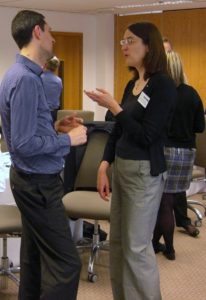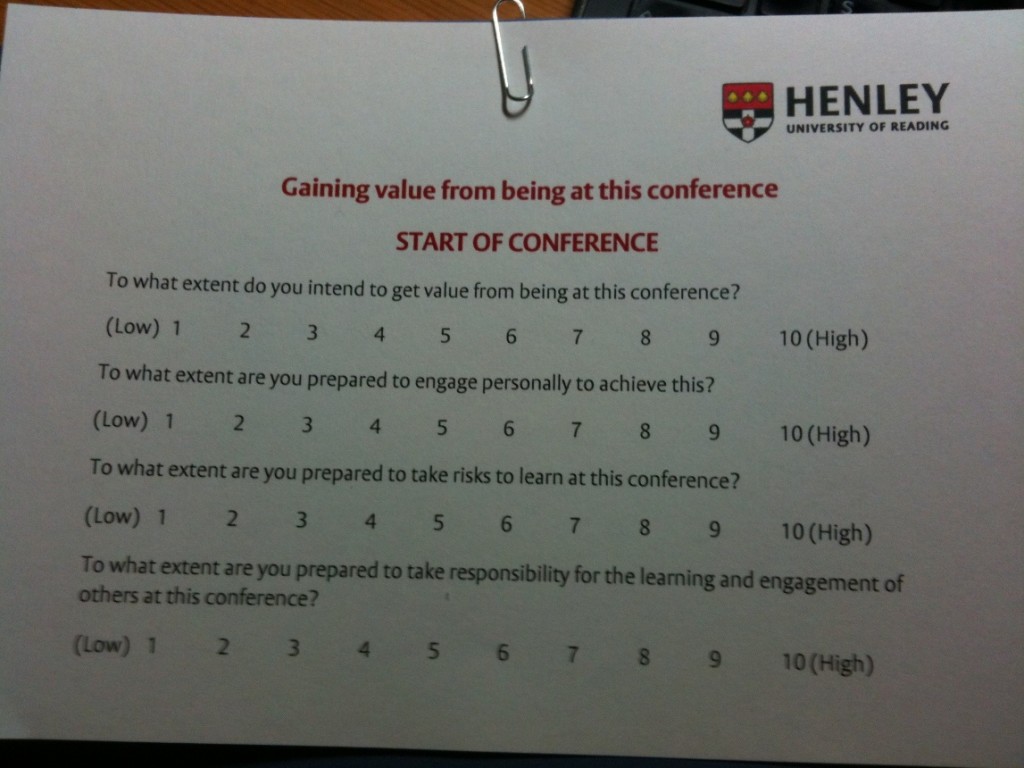How many people at a conference or a workshop genuinely engage with the day and consider they are as much an owner and co-creator of the experience as the chairperson, speakers, and facilitators?

And how many are happy to sit there, entranced, passively listening, and doing as they are told?
This short process built around Peter Block’s four ownership questions takes less than five minutes to run at the start of an event. It can help transform the day by getting everyone to think about and engage in the activities, particularly how they interact with other people.
The 5-minute session
To what extent are you prepared to take responsibility for the learning and engagement of others at this event?
How often do you ever give a question like this any thought at the start of a conference or a workshop?
The 15-minute session
You can combine the Four Questions with a few rounds of speed conversation. Such a session may take about 15 minutes and form an engaging, lively start to any event.
Peter Block’s four ownership questions
- To what extent do you intend to get value from being at this conference?
- To what extent are you prepared to engage personally to achieve this?
- To what extent are you prepared to take risks to learn at this conference?
- To what extent are you prepared to take responsibility for the learning and engagement of others at this conference?

We must establish a personal connection with each other.
Connection before content.
Without relatedness, no work can occur.
This process is such a short, effective way of setting the tone of a conference and reframing peoples’ mindsets from a passive stance to a more interactive, engaging one.
Posts that link to this post
- C-group Develop your interpersonal and conversational skills
POST NAVIGATION
CHAPTER NAVIGATION
SEARCH
Blook SearchGoogle Web Search
If you enjoy my work and find it valuable, please consider giving me a little support. Your donation will help cover some of my website hosting expenses.
Make a donation


This is a very interesting way to start off a conference. It would be great if we know what is the “Why” behind each of the Four Questions, the bigger picture.
I don’t understand your comment Adeline :-) Could you explain in more detail, please.
If each of the questions started “To what extent and why …” is that what you are suggesting?
Thanks David
I know this is an old thread. I’m thinking Adeline was chunking up, going meta to, the entire Four Questions process and inquiring about its overall purpose and intended result. In other words, “What’s it for?”
Hi Kirk,
Don’t my opening remarks explain the why?
“How many people at a conference or a workshop genuinely engage with the day and consider they are as much an owner and co-creator of the experience as the chairperson, speakers, and facilitators?
And how many are happy just to sit there, entranced, passively listening, and doing as they are told?
This short process built around Peter Block’s four ownership questions takes less than five minutes to run at the start of an event and can help transform the day by getting everyone to think about and engage in the activities, in particular, how they interact with other people.”
What am I missing?
thanks David
Your intro was certainly enough for me. And now re-re-reading Adeline’s comment, I actually think she may have been looking for the purpose and intended result of each of the four questions. Of course, my mind-reading skills may be lacking… ;-)
On another note, I found these questions to be interesting to consider…and…for my style, they are too “pushy”. For me, asking “to what extent” presupposes that one should (ought to, got to, must, need to, have to) adopt the implied value frames. Like an authority asking, “These attitudes and actions are expected and to what extent will you comply?” It feels heavy-handed to me, like obedience is required.
I prefer different approaches that are framed as invitations and have less chance of evoking a participant’s negative polarity reactions. For example, I would reframe the first question with something like, “We’ve prepared a smorgasbord of learning opportunities for you today. We invite you to taste whatever interests you, and we hope you enjoy this learning opportunity.”
Asking someone to rate their intention at the start of the workshop also seems counter-productive. For example, for question number two I would prefer to invite people to go inside and check out how they’re feeling at the moment. “Are you excited to connect and engage or do you feel more like a hermit and wish you would have stayed home with a good book?” I like to provide the space for people to notice their current state and then give them lots of room to accept whatever is so for them at the moment. “On a scale of 1 to 10, how much do you feel like engaging right now?” Then we could do some energizing conversational speed rounds and ask them to re-rate their interest in engaging, noticing what’s the same and what’s different.
I like to invite participants to notice and follow their interests and to see if they can co-create enjoyment doing so.
Very, very useful and practical.
Peter’s question “To what extent are you prepared to take responsibility for the learning and engagement of others at this event? is just awesome :-)